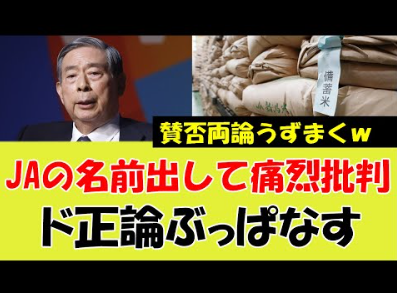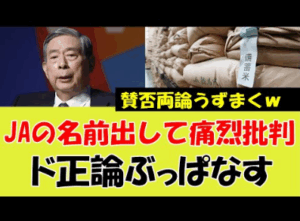【Shigeo’s Review】
日本政治のゆっくり井戸端会議 The Slow Well-Being of Japanese Politics
*According to some reports, the cause of the rice riot in 2021 is becoming clearer with each passing day as testimonies from growers and others reveal the entry of Chinese companies, home centers, scrap dealers, IT companies, temporary staffing agencies, and speculators in the Dojima market, among others.
There are also indications that there is a shortage of rice due to reduced rice acreage.
The rice fiasco is too complicated…
What Yoshitaka Kitao, chairman of SBI Holdings, said about stockpiled rice is causing controversy on the Internet.
He said, “You keep talking about how it’s going to flow to JA forever, but how much stockpiling do you need to fix before it settles down?” He then went on to poignantly point out that “the idea of exporting rice while there is a shortage is insane.” This statement was taken as a strong criticism of policies and industry practices that ignore the poverty of the general public.
First of all, as evidenced by the many positive comments, such as “It is really as you say,” “It is just a good argument,” and “It has been a long time since I heard a sane opinion,” Chairman Kitao’s statement matches well with public sentiment toward the current stockpiling and rice distribution system.
In particular, from the perspective of ordinary households that feel rice is in short supply, there is deep-seated dissatisfaction with the current situation in which only exports are prioritized, and his words have been taken as a voice for them.
At the same time, however, there are also strong criticisms such as “Chairman Kitao is the master of the rice market,” “Isn’t this a double standard?” and “As the person who started the futures market, isn’t he also responsible for the market?
This is because it has been pointed out that he himself played a role in the rice futures market and may have influenced price fluctuations and distribution problems. In other words, there is an underlying suspicion that pointing out problems with the system in which he has been involved is contradictory and unreliable.
Furthermore, there is a view that there may be a backstory to this statement as well. While it is certain that Chairman Kitao’s words represent the voice of the people, the possibility that he may be using them to exert political pressure or to strengthen his position within the industry cannot be denied.
In this regard, the background and context of the statements need to be analyzed dispassionately, as well as the media’s cut-and-dried reporting.
What we can also see from the uproar is the need for the public to be more vocal and proactive in communicating their opinions to the industry and politicians.
Not only from “big shots” like Chairman Kitao, but also from the general public and consumers, the louder their voices are heard, the more likely they will actually be reflected in policy and taxation. Currently, Japan’s food stockpiling and distribution system faces many challenges, and discussion and action from many sides are essential to solving them.
Chairman Kitao’s remarks were more than just a personal opinion; they highlighted the challenges of Japan’s current food stockpiling problem, agricultural policy, and distribution system.
It is natural that there are pros and cons, but this discussion should be a catalyst for the entire nation to share an awareness of the issues and seek constructive measures for improvement.
It is hoped that more such frank expressions of opinion will be made in the future, and that a trend toward serious consideration of food security by society as a whole will spread.


